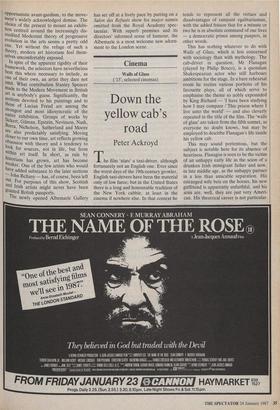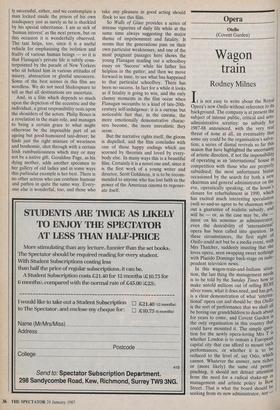Cinema
Walls of Glass (`15', selected cinemas)
Down the yellow cab's road
Peter Ackroyd
The film 'stars' a taxi-driver, although fortunately not an English one. Ever since the worst days of the 19th-century growler, English taxi-drivers have been the material only of low farce; but in the United States there is a long and honourable tradition of the New York cabbie, at least in the cinema if nowhere else. In that context he tends to represent all the virtues and disadvantages of rampant egalitarianism, with the added frisson that for a minute or two he is in absolute command of our lives — a democratic prince among paupers, in other words.
This has nothing whatever to do with Walls of Glass, which is less concerned with sociology than with mythology. The cab-driver in question, Mr Flanagan (played by Philip Bosco), is a quondam Shakespearian actor who still harbours ambitions for the stage. In a bare rehearsal room he recites various portions of his favourite plays, all of which serve to emphasise the theme so nobly expounded by King Richard — 'I have been studying how I may compare / This prison where I live unto the world' — and also cleverly repeated in the title of the film. The 'walls of glass' are taken from the fifth sonnet, as everyone no doubt knows, but may be employed to describe Flanagan's life inside his yellow cab.
This may sound portentous, but the subject is notable here for its absence of heaviness. Flanagan is seen to be the victim of an unhappy early life as the scion of a drunken Irish immigrant father and now, in late middle age, as the unhappy partner in a less than amicable separation. His estranged wife bets on the horses, his new girlfriend is apparently unfaithful, and his sons are, well, they are just very Ameri- can. His theatrical career is not particular- ly successful, either, and we contemplate a man locked inside the prison of his own inadequacy just as surely as he is shackled by his special inheritance. I am as sick of `human interest' as the next person, but on this occasion it is wonderfully observed. The taxi helps, too, since it is a useful vehicle for emphasising the isolation and frailty of various human beings — so it is that Flanagan's private life is subtly coun- terpointed by the parade of New Yorkers who sit behind him in various attitudes of misery, abstraction or gleeful unconcern. Some of the best scenes in this film are wordless. We do not need Shakespeare to tell us that all destinations are uncertain.
And, in a film which depends so much upon the depiction of the eccentric and the individual, a great responsibility rests upon the shoulders of the actors. Philip Bosco is a revelation in the main role, and manages to bring a certain grace to what might otherwise be the impossible part of an ageing but good-humoured taxi-driver; he finds just the right mixture of weariness and bonhomie, shot through with a certain Irish rumbustiousness which may or may not be a native gift. Geraldine Page, as his dying mother, adds another specimen to her gallery of old ladies and in some ways this paiticular example is her best. There is no other actress who can combine humour and pathos in quite the same way. Every- one else is wonderful, too, and those who take any pleasure in good acting should flock to see this film.
So Walls of Glass provides a series of intense vignettes of daily life while at the same time always suggesting the major theme of imprisonment and fatality. It seems that the generations pass on their own particular weaknesses, and one of the most poignant passages here shows the young Flanagan reading out a schoolboy essay on `Success' while his father lies helpless in the gutter; and then we move forward in time, to see what has happened to that particular schoolboy. There has been no success. In fact for a while it looks as if fatality is going to win, and the only clumsy moments in the film occur when Flanagan succumbs to a kind of late-20th- century self-indulgence: it is a curious but noticeable fact that, in the cinema, the more emotionally demonstrative charac- ters become, the more unrealistic they seem.
But the narrative rights itself, the gloom is dispelled, and the film concludes with one of those happy endings which are scorned by theorists and loved by every- body else. In many ways this is a beautiful film. Certainly it is a novel one and, since it is the first work of a young writer and director, Scott Goldstein, it is to be recom- mended to anyone who has lost faith in the power of the American cinema to regener- ate itself.



















































 Previous page
Previous page